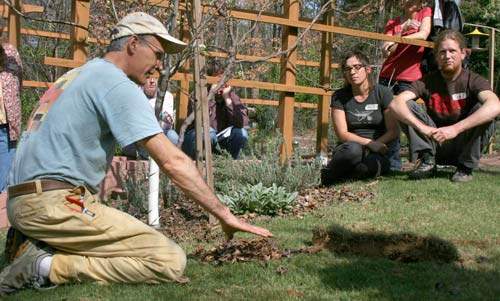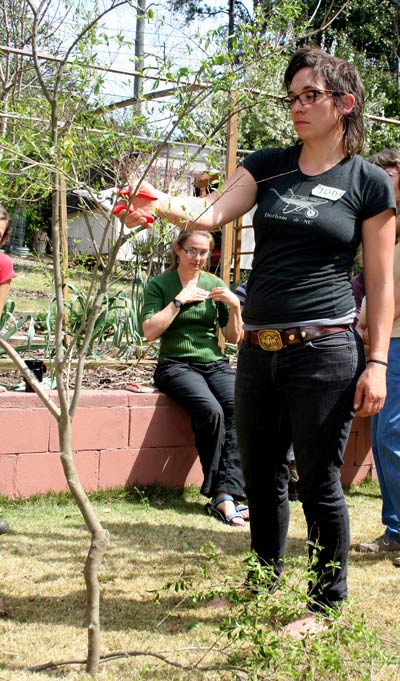By Abby Moore
UNC Staff Writer
the Durham VOICE
thedurhamvoice@gmail.com
Bradford pears are blossoming, daffodils are blooming and the bees are buzzing with a clear message – spring is here in Durham. Bountiful Backyards, along with SEEDS, welcomed the season with the first ever Piedmont Fruit School on March 17 and 18.
Fruit tree lovers united Saturday and Sunday at a site on Woodburn Road and at SEEDS community garden to learn from Asheville-based fruit tree instructor Bill Whipple. More than 20 attendees learned how to plant, prune and protect various trees and vines, including apples, pears, cherries, peaches and even kiwis.

Fruit school instructor Bill Whipple explains the importance of soil as fruit school attendees Jodi Hart and Tom Persimmons observe. Whipple offers several fruit tree classes each spring through Barkslip's Micro-Nursery. (Staff photo by Abby Moore)
“It’s all about site selection and soil,” Whipple says as he instructs students how to maintain peach trees.
The fruit school is one of several events Bountiful Backyards hosts to help educate the Durham community on gardening. SEEDS, which stands for South Eastern Efforts Developing Sustainable Spaces, partnered with Bountiful Backyards for the event. Keith Shaljian, founder of Bountiful Backyards, says the focus is community involvement.
“We want to get people to grow more in their own communities,” Shaljian says. “We focus on education and community benefit.”
Shaljian, who spent several years working in the restaurant business, started Bountiful Backyards five years ago with his brother, Mike, with the desire to help the Durham community create edible gardens. Since then, the cooperative has created 12 community gardens and serviced over 200 houses.

Fruit school attendee Jodi Hart prunes a bradford pear tree as SEEDS garden manager Hilary Nichols observes. (Staff Photo by Abby Moore)
Bountiful Backyards offers services such as garden installation, maintenance, consultations and classes at Durham Technical Community College.
“As our revenue increases, we have the ability to do more stuff in the community and focus less on selling our services,” Shaljian says.
Shaljian says many of their events, like the fruit school, are funded by suggested donation, and some are free. “No one is ever turned away,” he adds.
Instructor Bill Whipple says fruit schools are important for the education they provide, but that they don’t always encourage community growth. In Asheville, this issue led to the creation of the Buncombe Fruit and Nut Club, a volunteer group that seeks to bring edible public gardens to the city and surrounding areas.
“We were able to create community with the club,” Whipple says. “With a club you share a subculture and find people to connect with who share the same passions.”
Durham resident Jenny Barwick attended the fruit school on Saturday. Barwick, who has several unplanted apple trees, says the fruit school gave her a lot of ideas.
“I learned tons of stuff,” Barwick says. “I discovered I have the perfect environment for pawpaw trees.”
Shaljian hopes events like the fruit school will encourage Durham residents to produce their own food.
“We want to give the Northeast Central Durham community access to farming so they need less from the industrial arena,” Shaljian says. “Because it’s not just about food. This is just one way to get people out to talk about bigger issues.”
Bountiful Backyards is hosting an organic vegetable garden workshop on Saturday, April 7 at a site on Cherry Grove Street in Durham. To register, or for more information, go to www.bountifulbackards.com/spring2012workshops
For a printer-friendly version of this post, click here.